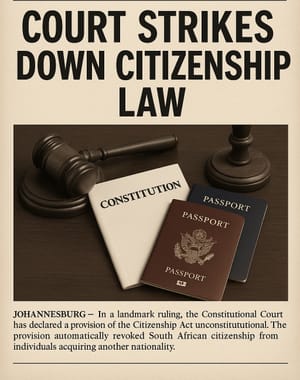One of the many downsides of today's smaller newsrooms is that some important issues just don’t get the coverage they deserve. I’ve always thought legal reporting has been generally poor in SA; with a weaker press, it's got worse. A good example is the recent case of Democratic Alliance v Minister of Home Affairs.
This was the culmination of a three-year legal saga stretching from the Pretoria High Court to the Constitutional Court, and the result is that South Africans who’ve picked up a second passport can exhale—and not just with a foreign accent.
The country’s apex court has finally ruled that a little-known provision in the Citizenship Act, which automatically stripped South Africans of their citizenship if they acquired another, was not just harsh, but flat-out unconstitutional.
This is all so ironic because the current Minister of Home Affairs, Leon Schreiber, a DA member, welcomed the finding despite the department being the respondent. The issue is kinda political because one of the effects of the case is that South African emigrés who are now citizens of other countries can vote here again - and, of course, emigres have overwhelmingly voted for the DA in the past, which was presumably one of the reasons why the DA brought the case.
Dual citizenship is something of a contested issue around the world. The argument against is simply that it can create conflicting loyalties and divided allegiances. It also allows, in certain circumstances, tax arbitrage and national security risks. Retrogressive governments, I would guess, think of it as unpatriotic.
But it's gradually gaining favour, particularly among democratic states; increasingly, we live in a globalised, mobile world, where identity, economy, and culture span borders. Loyalty is not zero-sum, and the legal complexities are manageable. The point is that often it's an act of patriotism rather than the reverse. People who work in foreign countries want and need to be eligible for local rights afforded to citizens. But often they intend to come back “home” at some point and don’t want to break ties entirely. Its allowed in a how bunch of European countries, and the US, but also in Nigeria, Kenya, Turkey, Pakistan and Bangladesh, for example. Its not allowed in a mixed bag of countries, including India, Indonesia, Saudi Arabia and Qatar - countries tending toward the authoritarian.
The case began with an obscure clause in the Citizenship Act, Section 6(1)(a), which quietly stated that any South African adult who voluntarily acquired the citizenship of another country would, poof, cease to be South African—unless they had the foresight to first grovel before the Minister of Home Affairs for permission to retain their citizenship. The minister, in turn, was free to grant or deny this permission at whim—if he “deemed it fit.”
But there’s a constitutional hiccup: the Bill of Rights explicitly declares, “No citizen may be deprived of citizenship.” While the Constitution does allow for some limitations, these must be “reasonable and justifiable in an open and democratic society.” A surprise citizenship trapdoor did not exactly make the cut.
The DA, smelling bureaucratic overreach, challenged the provision back in 2021. The Pretoria High Court initially sided with the state, arguing that the provision didn’t deprive anyone of citizenship—it merely caused a loss, a sort of bureaucratic shrug. But this semantic sleight-of-hand didn’t hold up on appeal.
The Supreme Court of Appeal (SCA) was not impressed. In 2023, five judges unanimously reversed the High Court’s decision, calling the law arbitrary and capricious.
They pointed out that the Minister of Home Affairs had failed to produce any legitimate purpose for the law beyond a vague appeal to the need to “regulate citizenship.” As the court dryly noted, all laws regulate something—that’s the job description. Regulation alone does not make a law rational.
More damningly, the SCA criticised the way the law delegated unchecked power to the Minister, allowing him to decide without criteria or oversight who got to remain a South African and who didn’t. A “recipe for capricious decision-making,” the court warned.
But typical of our government, the Home Affairs department, before the establishment of the Government of National Unity, persisted and took the issue to the Constitutional Court. In a unanimous judgment, all nine justices found the provision to be indeed a deprivation of citizenship, not a benign “loss.” The distinction wasn’t just linguistic nitpicking. As the justices pointed out, “to deprive” implies state action—you had it, now it’s been taken from you. And to do so without notice, justification, or even awareness? That’s not regulation. That’s ambush.
The court ruled that such deprivation violated not just the right to citizenship, but also a bouquet of rights that follow from it: the right to vote, to stand for office, to move freely, to hold a passport, and to dream of returning home after that stint in bluddy cold Toronto.
In short: your passport is yours. Even if you get another one.
The ruling affects potentially thousands of South Africans living abroad who unknowingly lost their citizenship over the years, often without being told, and possibly even without the Department of Home Affairs realising it. Under the court’s order, anyone who lost their citizenship due to this provision is deemed never to have lost it in the first place. A bureaucratic ghost story with a happy ending.
It also sets a powerful precedent: citizenship is not something you misplace in a drawer. It’s not the government’s to take on a whim. It’s a right, not a permission slip.
For South Africans abroad, many of whom live with one foot in each hemisphere, this is a seismic shift. Dual nationality is now formally recognised as compatible with the Constitution. And for the government? A cautionary tale about the perils of overreach and the enduring strength of constitutional protections.
This case reveals something deeper than a technical legal tweak—it’s about identity, belonging, and the ever-thorny question of what it means to be a citizen in a nomadic, modern world. Home isn’t just where the heart is. Sometimes, it’s also where the Constitutional Court has your back.
The case also illustrates how SA's legal context is changing with the advent of the GNU - but in a quiet and understated kind of way. There may be more changes that actually go unnoticed, but they will be significant anyway.
And that relates to how poorly the case was reported: it was handed down almost a month ago, and it did get some brief and scattered press. But given its import, it's surprising how little coverage it got. As far as I can see, none of the big news outlets gave it any prominence, if they reported it at all. This is a unanimous decision of the apex court!
It may not affect that many people, but legislative overreach is almost everywhere in the modern era, particularly in SA, and this was a good example of how the Constitution acts as a check on power.
The finding deserved better. 💥
From the department of the world not being all bad ...

From the department of ancient, antediluvian, antique, and extinct ...

From the department of other animals not being less likely to wrap themselves up in blankets while drinking whiskey and smoking ...

Thanks for reading - please do share if you have a friend (or enemy!) you think would value this blog and ask them to add their email in the block below - it's free for the time being. If the sign-up link doesn't appear, you'll find it on the site.
Till next time. 💥





Join the conversation